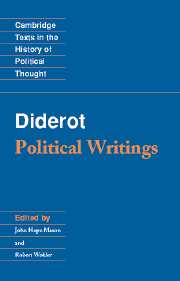Extracts from the Histoire des Deux Indes
Published online by Cambridge University Press: 05 June 2012
Summary
Editorial preface
Among the manuscripts found in the Fonds Vandeul were a number relating to the abbe Raynal's Histoire des Deux Indes. Diderot's participation in this work had been rumoured during the 1780s and had been evident to scholars since the late nineteenth century, but only with this discovery did a full appraisal of his contribution become possible. It is now clear that Diderot used Raynal's work to publish a great deal of his own material, and this has transformed our knowledge of his thought in the final years of his life.
Two substantial collections of these writings have been published by Gianluigi Goggi: Pensées détachées (Siena, 1976) and Mélanges et morceaux divers (Siena, 1977). Selections have appeared in Roger Lewinter's edition of Œuvres complètes de Diderot (Paris, 1973) and Yves Benot's volume of extracts from Raynal's Histoire (Paris, 1981). A critical edition of Diderot's contributions is being prepared by Goggi for the Hermann edition of the Œuvres complètes. In the meanwhile scholars can consult the invaluable analysis provided by Michèle Duchet in Diderot et l'Histoire des Deux Indes ou l'écriture fragmentaire (see Further reading), which indicates what seem to be all Diderot's contributions, identified by reference either to material from the Fonds Vandeul or to other texts by him. For complex reasons not all the attributions are certain, and, since we know that Diderot allowed Raynal to alter his text at times, we cannot always be sure that the printed version reflects his exact words.
- Type
- Chapter
- Information
- Diderot: Political Writings , pp. 165 - 214Publisher: Cambridge University PressPrint publication year: 1992



